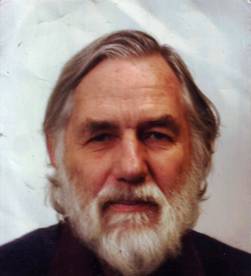Robert Bruce Karim King 1923-2012
 Geomorphologist who applied Land Systems to planning in South Africa, but was forced to leave after an illegal marriage and political activism
Geomorphologist who applied Land Systems to planning in South Africa, but was forced to leave after an illegal marriage and political activism
Bruce King died suddenly at his home in Esher in April. At his Muslim funeral the Imam accorded him the accolade of ‘Sheikh’, with its connotations of wisdom and learning.
Although born and schooled in England, Bruce opted to do his geology degree at Durban. Natal geology at that time was much influenced by geomorphologists, who were developing ideas on retreating pediments and stepped pediplains as the dominant processes shaping the South African landscape. This gave Bruce his lifelong interest and career in geomorphology. After graduation he worked in in Cape Town, with a group that was developing African applications of Land Systems. These are recurrent landscape patterns in which soils and natural vegetation vary systematically from crest to drainage line provided that the lithology and climate remain fairly uniform. Once characterised, Land Systems facilitate rapid identification and location of particular resources, and are also an excellent way of encapsulating complex distributions of land resources in large areas.
Although he found the work interesting, Bruce was uncomfortable with politics and life in South Africa. After a (then illegal) marriage, conversion to Islam, and support for the ANC, he had to leave. He took a geomorphological doctorate at Edinburgh, and then joined the Land Resources Division of ODA, which was the technical branch for agricultural development in British overseas aid. His first major assignment was to co-found the Bureau for Land Use Planning in Tanzania, which applied Land Systems to map land resources. The Bureau made great use of aerial photographs and, later, satellite imagery, and this furthered Bruce’s interest and expertise in remote sensing.
After Tanzania, Bruce participated in major Land System environmental surveys for agricultural and forestry developments in northern Nigeria, the whole of Indonesia and the whole of Belize, initially as the geomorphologist and remote sensing specialist, but later as leader of multidisciplinary teams. By the end of his time in LRD, Bruce had moved away from merely assessing and mapping land resources, and, particularly in Belize, became actively involved in the complexities of multi-disciplinary and multi-sectoral planning.
In retirement, the political changes in South Africa meant that Bruce could return to his interest in the South African landscape, and he embarked on a systematic geomorphological survey of the country. He was also working on a tropical geomorphology and remote sensing book.
The whole of Bruce’s life was influenced by his egalitarian ideals. After returning to England he became an active member of the Labour Party, and he was a staunch trades unionist within LRD. In retirement he gave much time and effort to the Fair Trade Movement. He was an engaging colleague and team leader - rigorous and meticulous but modest, gentle, humorous and helpful. He developed warm and mutually respectful ties with host country counterparts. He took a refreshingly lateral look at issues, as shown by his solution to the problem of remaining physically active in retirement - by becoming the oldest and best-qualified paper-boy in the Surrey stockbroker-belt.
Ian Baillie